Today, a large number of students dream of entering European universities, because this is an opportunity not only to live an absolutely independent life, but also to test their own adaptability to new conditions, to gain invaluable experience and good knowledge. That is why in this article we will cover such a topic as universities in Austria. Should applicants opt for this European Union country? The time has come to answer this question as exhaustively as possible.
General condition of the educational system
For several years now, Austrian universities have remained at the peak of demand because they are recognized by prestigious educational institutions not only as European companies, but also organizations of the rest of the world. Almost all educational institutions are classified as state-owned and are subordinate to the Ministry of Science and Transport.
The most popular universities in Austria are located in large cities, namely in the capital, Vienna, as well as in Salzburg and Graz. The vast majority of them are financed from the state budget; exceptions are such individual units, such as the Danube University of Postgraduate Education in the city of Krems, which receives only partial funds from the federal treasury. According to a survey conducted in European territories, Austrian educational institutions take pride of place in the ranking of the best universities of the continent; 4 faculties of 3 Austrian universities were especially positive. So, in Graz, technical and applied sciences are especially well developed, in Vienna - economics, in Salzburg - jurisprudence and law.
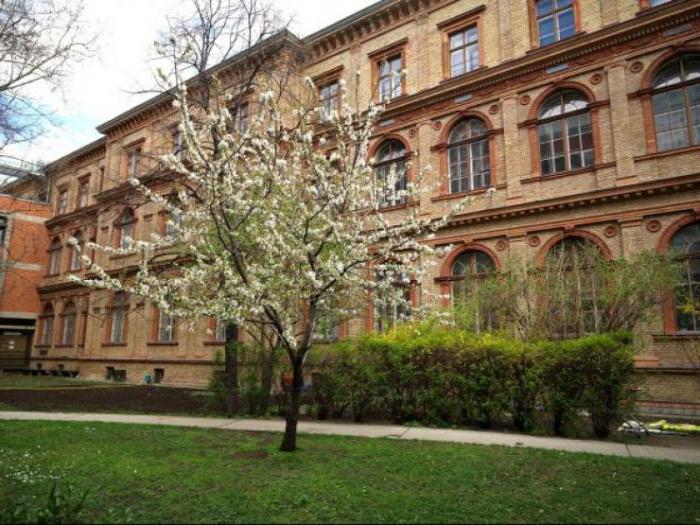
What institutions in general can get higher education?
It should also be noted that the system of higher Austrian education consists not only of universities; it also includes such separate categories as art universities (there are only 6 of them in the country), colleges that graduate social workers and teachers, as well as higher schools. However, of all these groups, universities are still the most prestigious and relevant for applicants.
Austria's largest universities in numbers
Currently, about 210 thousand students are studying in the country, classes for which are conducted by 18 thousand teachers! The prevailing number of students, namely 96 thousand people, are registered at the University of Vienna. 22 thousand students each also belong to the Vienna University of Economics and the University of Technology located in the capital. The university to them can boast of a decent number of trained specialists. Karl-Franz, located in Graz, which counts over 32 thousand people. The last of the largest educational institutions is the University of Salzburg, where 14.6 thousand people study. The remaining universities in Austria are much smaller and do not provide educational services to such a large part of the population, but this does not detract from their objective merits.
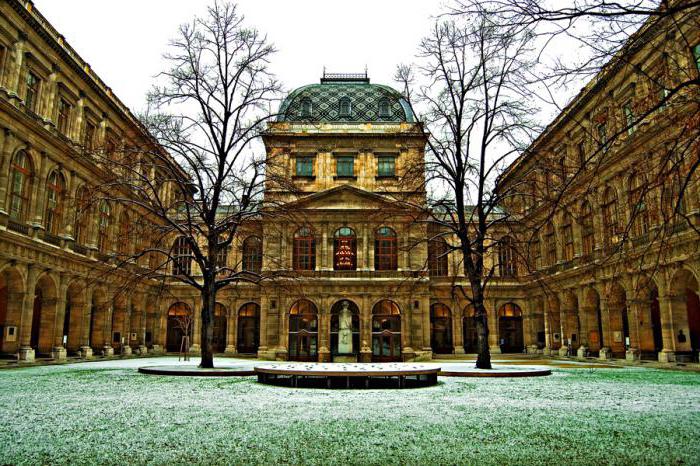
The advantages of Austrian universities
Is it really worth giving up studying in your native country and moving to Austria? This is a difficult step to help decide on which a list of the real benefits of getting an education in this rapidly developing European state can be. Let's evaluate them together:
- Education is implemented in state universities on the basis of a budget form (i.e., completely free) or affordable for a student. So, in some institutions people from the CIS countries can study for only 20 euros per semester, provided that they win a state grant.In other cases, for 1 semester, you will have to spend an average of about 400 euros, but in some places the rates can be much higher (up to several thousand euros per semester).
- For foreigners, Austrian universities, especially if a person already has one completed education, is an excellent option, because usually there are no additional entrance exams. A Russian should submit only a certificate confirming the presence of a general secondary school education, and admission to receive the chosen profession (i.e., the absence of any contraindications). Unfortunately, admission to a state university after graduation is often fraught with difficulties, and each such case is considered individually. However, you can try your hand at private educational institutions - here the path is always open.
- Training is conducted in German and English. Despite the fact that Austrian universities in English still require the applicant to pass a state exam in German, this usually does not entail serious difficulties, since it is easier to pass it than in some other countries. For preparation, various social institutions and auxiliary resources have been created: you can pre-register for a language school (the cost of a full course will be about 2000 euros) or enroll in a training program at a German university. At the same time, a foreign student will be able to use all the offered benefits and assistance from the state.
- The opportunity to participate in the practice of exchanging students with other countries. Austrian universities have a large number of existing partnership agreements with leading American, French and English universities.
- Austrian educational programs combine an innovative approach, modern scientific achievements and ancient traditions, the synthesis of which as a result forms a European high quality standard.
- A student will be able to combine work and study without damaging either one or the other. The labor policy for students here is taken under close control by the authorities, so the student should not be afraid for a non-monetary existence or, on the contrary, processing: he will be able to work a maximum of 20 hours during school weeks and receive up to 380 euros for this. Moreover, during the holidays, any restrictions on the student’s work are removed.
- In addition to all of the above, Vienna takes the 1st place in the international ranking of Mercer in terms of quality of life! It has been supported on it for the past 5 years. This affects students: they get comfortable dormitory rooms that look like separate apartments, as well as all the conditions for a full, pleasant life. The same applies to other Austrian cities.
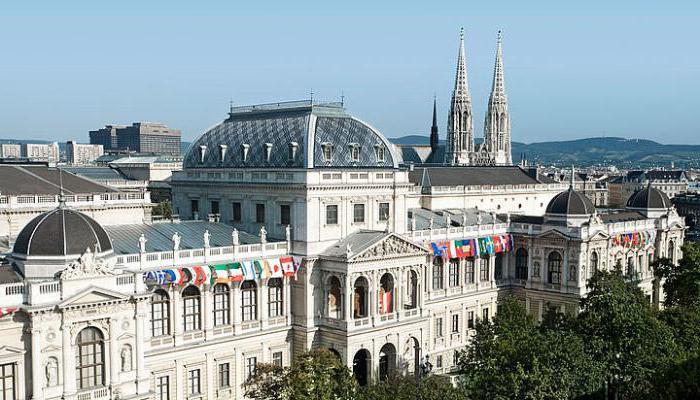
But what about further legalization?
Higher education institutions provide their students with the opportunity to get well in the state in the future and stay there forever. This is stipulated by the conditions for changing a student residence visa on Rot-Weiss-Rot, provided that the person has a contract for work with wages that exceed the minimum wage in the country. This guarantees the state not only the economic viability of the citizen, but also its integration into the new social environment. Also, in addition to the fact that while studying at an Austrian higher education institution, young people receive a deferment from compulsory military service, and they, and girls, if they wish, after 10 years of living and working in the country, can receive a passport of a full citizen of Austria with the only condition - refusal from Russian citizenship.
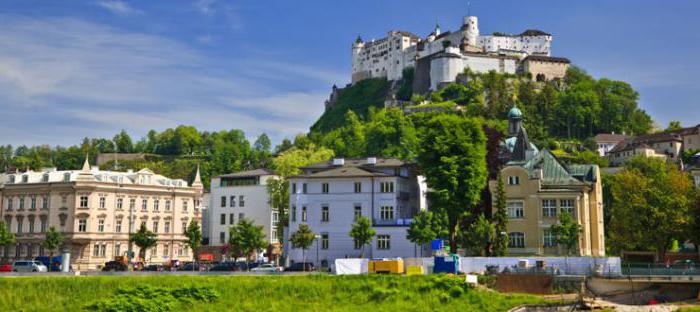
Colorful Austria: Universities of Vienna
The famous Vienna National University, the photo of which is presented below, boasts a long history, because it is the oldest of all higher education institutions that exist today in the German-speaking regions. Its founder was Rudolph IV, who created the institution ... in 1365! The university is an alma mater for many Nobel Prize winners. Today there are 18 faculties that offer applicants a total of 54 programs for bachelors (duration of study - universal 3-4 years), 112 programs for masters (from 2 to 3 years) and 11 programs for doctors (from 1 year). Every year, students from 130 countries flock to the walls of the institution. Popular areas are medicine, biology and the humanities. The average price for tuition on a paid basis is about 380 euros per semester, but you will additionally have to spend money on textbooks and books. The work of the university is carried out through the activities of 60 buildings.
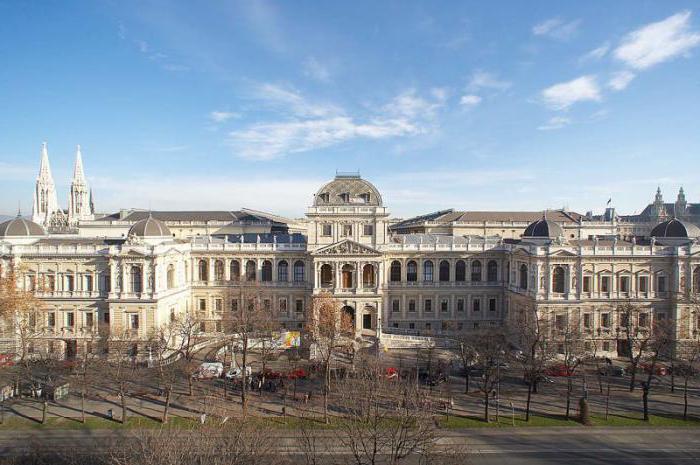
Technical Specialties
Technical universities in Austria also graduate in demand and competitive professionals in a wide range of different industries. One of the institutions is the Technical University of Graz (photo can be seen below), which is among the top 20 best technical schools in the entire EU. The best European and international research projects are regularly developed here (today their number reaches 90). A powerful scientific base and the latest equipment help students to successfully study at the faculties:
- architecture;
- engineering and construction;
- economics;
- mechanics;
- computer science;
- computer engineering and electronics;
- technical chemistry and biochemistry;
- physics and mathematics.
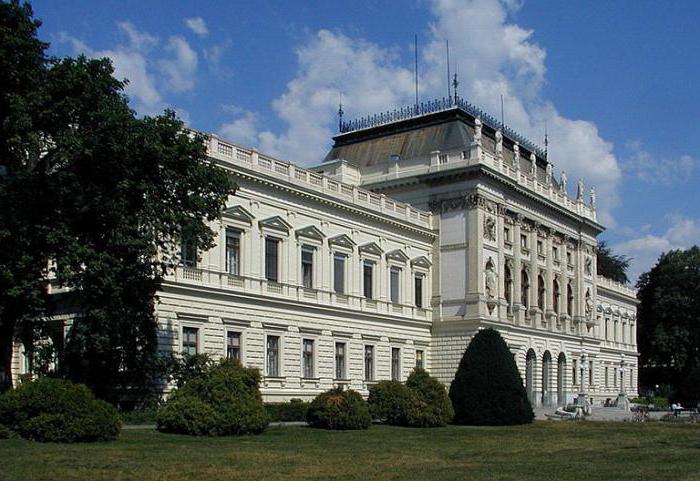
Another popular university with similar areas is the Vienna Technical University. Education in one and the other institution will cost the student 382 euros per semester.
The medicine
Medical universities in Austria are headed by the Medical University in Vienna, which in 2015 celebrated its 650th anniversary! Annually about 8 thousand people come here for programs in the following departments (institutes):
- clinical institutes;
- research centers;
- university clinics;
- research participation service for commercial companies;
- Bernhard Gottlieb Dental Clinic;
- Max F. Perutz Laboratory
- specialized institutes.
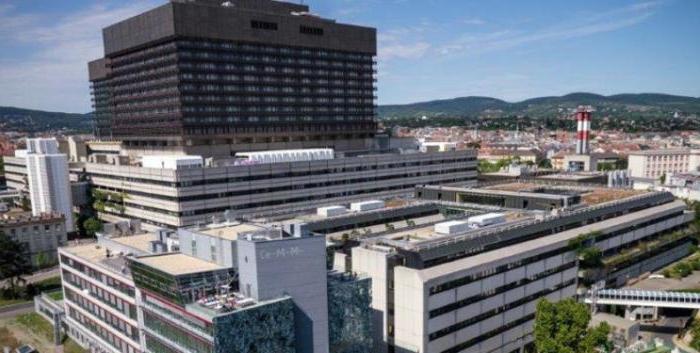
Here, for 380 euros per semester, the work of the brain, genetics, physiology, biomedical technology, cell biology and other medical sections are studied and studied. Projects related to oncology, life extension methods, immunology, etc. are ongoing.
How to try your hand?
If you want to plunge into the world of Austrian educational reality, you can first try to participate in the exchange program implemented within the framework of activities and domestic educational institutions. So, short-term semi-annual exchange programs conducts MSTU. Bauman: at the end of the 2nd year, a student can go to the University of Applied Sciences of Upper Austria. The training will be free, and only the fee for a round-trip flight, meals and accommodation will fall on the shoulders of the student. In this case, documents should be submitted at least one semester before the start of the desired study in another country. Academic exchange is a good opportunity to look not only at education, but also at the life, life, culture of students receiving education in Austria, and answer yourself the question of whether you want to get a diploma there or not.